In today’s digital age, having a strong online presence is crucial for businesses to thrive. Search Engine Optimization (SEO) plays a vital role in improving a website’s visibility and driving organic traffic. To achieve optimal results, it is essential to leverage the power of SEO optimization tools. In this article, we will explore the top SEO optimization tools available in the market and delve into their exclusive features.
Table of Contents
Summary
- Google Analytics provides detailed insights into website traffic, allowing businesses to understand their audience and make data-driven decisions for SEO optimization.
- Ahrefs offers in-depth analysis of a website’s backlink profile, organic search traffic, and keyword rankings, helping users identify link-building opportunities and fix technical SEO issues.
- SEMrush provides a robust keyword research tool among all SEO Optimization tools, competitor analysis, site audit feature, and social media tracker, helping users optimize their content, track SEO performance, and improve online presence.
- BrightLocal offers tools specifically designed for local SEO optimization, including local search rank tracking, citation building, and review monitoring, helping businesses manage their online reputation and improve local visibility.
- KWFinder provides a powerful keyword research tool, SERP analysis, location-specific keyword search, and insights into competitors’ keyword rankings and content strategies, helping users target the right keywords and a competitive edge.
- Answer the Public generates a comprehensive list of questions and comparisons related to a keyword, helping users discover content ideas and address their audience’s queries effectively.
- Moz Local Listing Score provides a detailed local SEO audit, monitors customer reviews, and offers insights into local search performance, helping businesses manage their online reputation and improve local visibility.
- Yoast SEO provides real-time suggestions for optimizing on-page content, generates XML sitemaps, optimizes content for social media, and offers features for managing redirects, improving readability, and internal linking.
What is SEO optimization?
SEO optimization, also known as search engine optimization, refers to the process of improving a website’s visibility and ranking in search engine results pages (SERPs). It involves various techniques and strategies aimed at optimizing a website’s content, structure, and performance to make it more appealing to search engines and users.
Why is search optimization tools important?
Having a strong SEO strategy is crucial for improving your website’s performance and achieving online success. Here are a few reasons why you need SEO to improve your website:
1. Increased Organic Traffic: SEO helps your website rank higher in search engine results, leading to increased visibility and organic traffic. When your website appears on the first page of search results, it is more likely to attract clicks and visits from users.
2. Better User Experience: SEO optimization involves improving various aspects of your website, such as site speed, mobile-friendliness, and user-friendly navigation. These improvements enhance the overall user experience, making it easier for visitors to navigate and engage with your site.
3. Targeted Audience: SEO allows you to target specific keywords and phrases relevant to your business or industry. By optimizing your website for these keywords, you can attract a more targeted audience who are actively searching for products or services like yours.
4. Brand Credibility and Authority: When your website ranks higher in search results, it instills trust and credibility in the minds of users. People tend to trust websites that appear on the first page of search results, which can help establish your brand as an authority in your industry.
5. Cost-Effective Marketing: Compared to other digital marketing strategies, SEO is relatively cost-effective in the long run. While it may require an initial investment of time and resources, the organic traffic generated through SEO can provide long-term benefits without the need for continuous advertising spend.
How to choose the best SEO Optimization tool?
let’s discuss how to choose the best SEO optimization tool:
1. Identify Your Needs: Determine your specific SEO requirements and goals. Consider factors such as keyword research, backlink analysis, on-page optimization, competitor analysis, and reporting.
2. Research and Compare: Conduct thorough research on different SEO optimization tools available in the market. Compare their features, functionalities, user reviews, and pricing plans to find the ones that align with your needs.
3. Consider User-Friendliness: Look for tools that are user-friendly and intuitive. A tool that is easy to navigate and understand will save you time and effort in the long run.
4. Integration and Compatibility: Check if the SEO tool integrates well with your existing website platform or content management system. Compatibility is crucial for seamless integration and efficient workflow.
5. Scalability and Flexibility: Consider whether the tool can accommodate your future growth and evolving SEO needs. It should be scalable and flexible enough to adapt to your changing requirements.
6. Customer Support: Evaluate the level of customer support provided by the tool’s provider. Look for responsive customer support channels, such as live chat, email, or phone support, to ensure prompt assistance when needed.
7. Pricing and Value: Assess the pricing plans of different SEO optimization tools and compare them against the features and value they offer. Consider your budget and choose a tool that provides the best value for your investment.
By considering these factors, you can choose one from the list of SEO optimization tools that aligns with your specific needs and helps you achieve your SEO goals effectively.
Top 8 SEO Optimization Tools
Google Analytics
- Google Analytics provides detailed insights into website traffic, including the number of visitors, their demographics, and behavior on the site which helps businesses understand their audience and make data-driven decisions for SEO optimization.
- With Google Analytics, users can track and analyze the effectiveness of their marketing campaigns in terms of conversions and revenue allowing businesses to optimize their SEO strategies to drive more conversions.
- Google Analytics enables users to set specific goals, such as newsletter sign-ups or purchases, and track their progress.
- Google Analytics provides up-to-the-minute data on website traffic, allowing users to monitor the impact of their marketing efforts in real-time helping in identifying trends and respond quickly to optimize their SEO strategies.
- Google Analytics offers a wide range of customization options, allowing users to tailor reports and dashboards to their specific needs.
- Google Analytics has a mobile app available for both iOS and Android devices that allows users to access their website’s analytics on the go.
- Google Analytics seamlessly integrates with Google Ads, providing users with valuable insights into the performance of their paid search campaigns helping optimize their SEO and paid search strategies for maximum impact.
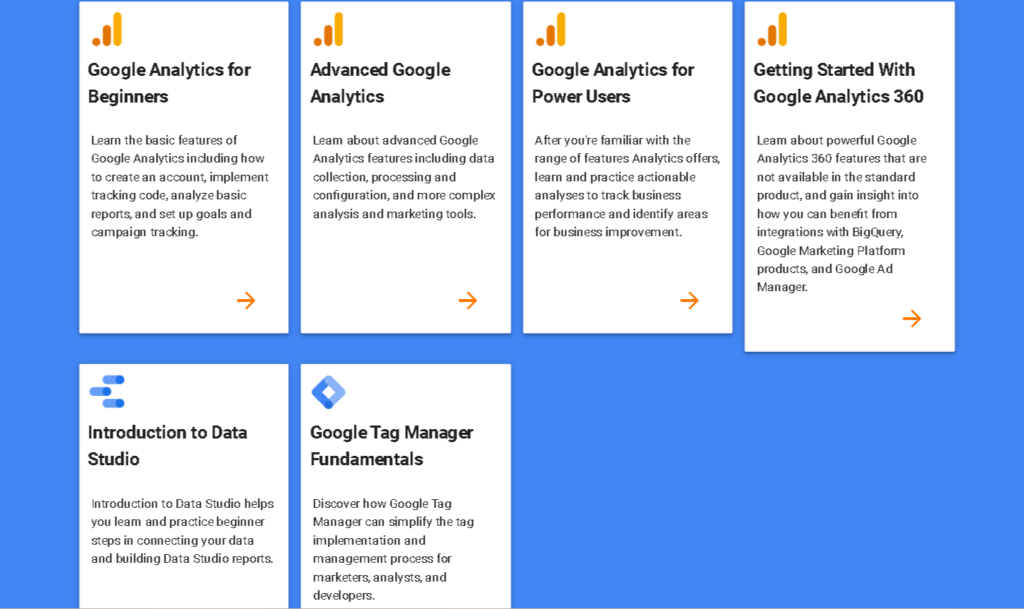
Ahrefs
- Ahrefs presents itself as a Site Explorer and a comprehensive tool that provides in-depth analysis of a website’s backlink profile, organic search traffic, and keyword rankings.
- It allows users to discover popular content in their niche, analyze its performance, and identify potential link-building opportunities.
- Furthermore, this platform helps in finding relevant keywords, estimating their search volumes, and analyzing their difficulty level.
- Ahrefs enables users to track their website’s keyword rankings over time and monitor their SEO performance.
- With its Site Audit feature, it identifies and fixes technical SEO issues that may hinder a website’s performance.
- Ahrefs’ competitive analysis tools provide valuable insights into competitors’ online presence, including their organic and paid search strategies, backlink profiles, and advertising campaigns.
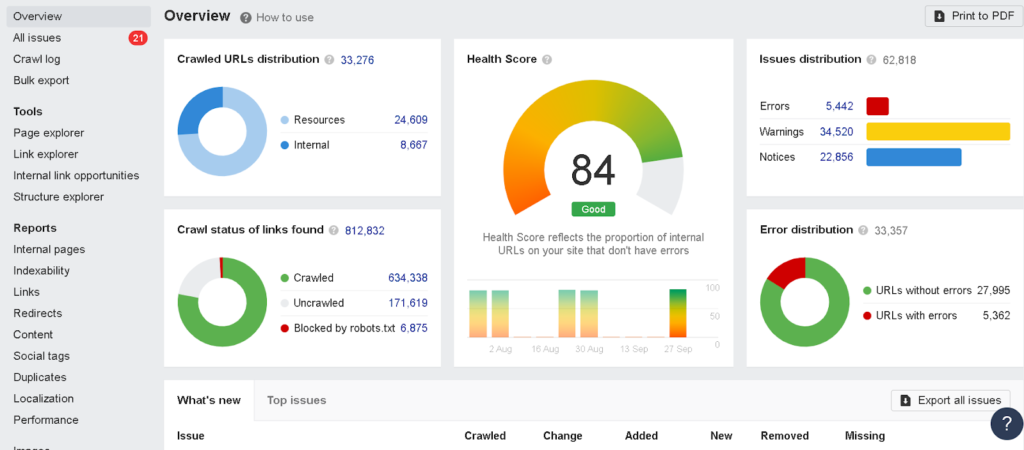
SEMrush
- SEMrush offers a robust keyword research tool that provides valuable insights into search volume, keyword difficulty, and competitor analysis helping users identify profitable keywords and optimize their content accordingly.
- SEMrush allows users to analyze their competitors’ online presence, including their organic and paid search strategies, backlink profiles, and advertising campaigns. This helps businesses gain a competitive edge and refine their own SEO strategies.
- SEMrush’s site audit feature helps users identify and fix technical SEO issues that may impact their website’s performance providing recommendations for on-page optimization, including meta tags, headings, and content structure.
- SEMrush provides detailed insights into a website’s backlink profile, including the number of backlinks, their quality, and potential toxic links.
- SEMrush’s social media tracker allows users to monitor their social media performance, including follower growth, engagement metrics, and competitor analysis helping optimize social media strategies and improve online presence.
- SEMrush offers a suite of content marketing tools, including a content analyzer, topic research tool, and SEO writing assistant which create high-quality, optimized content that resonates with their target audience.
- SEMrush provides comprehensive reporting and analytics features, allowing users to track their SEO performance, monitor keyword rankings, and generate custom reports.
- SEMrush does have a mobile app available for both iOS and Android platforms.
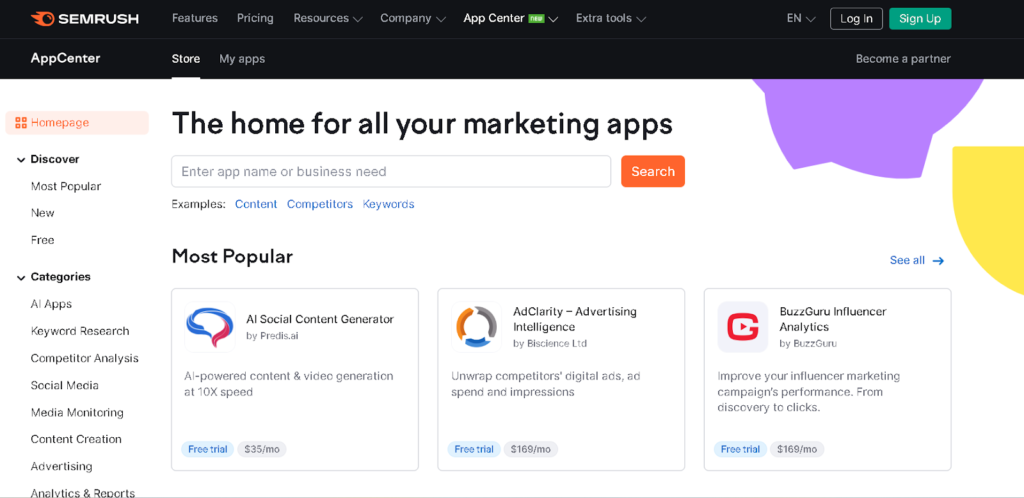
BrightLocal
- BrightLocal offers a suite of tools specifically designed for local SEO optimization, including local search rank tracking, citation building, and review monitoring.
- With BrightLocal, businesses can monitor and manage their online reputation effectively by tracking customer reviews and mentions across various platforms, allowing businesses to respond promptly and address any negative feedback.
- BrightLocal provides detailed analytics and insights into a business’s Google My Business profile unlike other SEO Optimization Tools.
- Users can track search queries, customer actions, and photo views, helping them understand their audience and optimize their Google My Business listing.
- BrightLocal’s local search audit feature identifies and fixes local SEO issues that may affect a business’s online visibility.
- It helps businesses ensure consistent NAP (Name, Address, Phone) information across directories and identifies duplicate listings that may confuse search engines.
- BrightLocal helps businesses generate more positive reviews by sending automated review requests to customers, streamlines the review generation process and helps businesses build a strong online reputation.
- BrightLocal has a mobile app available for both iOS and Android devices.
- BrightLocal provides insights into competitors’ local SEO strategies, including their rankings, backlink profiles, and content strategies.
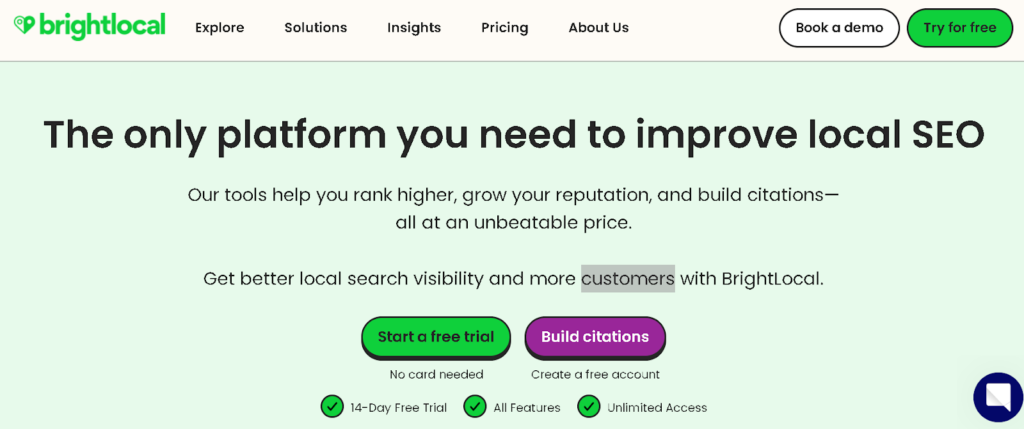
KWFinder
- KWFinder offers a powerful keyword research tool that helps users find relevant keywords with low SEO difficulty and high search volumes helping users target the right keywords and optimize their content effectively.
- Using KWFinder, users can perform SERP Analysis to gain insights into competitors’ backlinks, social signals, and on-page optimization for a specific keyword, helping businesses adapt their SEO strategies.
- KWFinder provides an estimate of the difficulty level of ranking for a specific keyword. This feature helps users prioritize their SEO efforts by identifying keywords that are easier to rank for, saving time and resources.
- KWFinder allows users to find keywords specific to a particular location. This feature is particularly useful for businesses targeting a local audience, as it helps them tailor their SEO strategies to their target market.
- KWFinder provides insights into competitors’ keyword rankings, backlink profiles, and content strategies. This feature allows businesses to identify their competitors’ strengths and weaknesses, helping them refine their own SEO strategies and gain a competitive edge.
- KWFinder offers a user-friendly interface that makes it easy for users to navigate and utilize its features. This intuitive design ensures a seamless user experience and allows businesses to optimize their SEO efforts efficiently.
- Unfortunately, KWFinder does not currently have a mobile app. However, the platform is mobile-responsive, users can use KWFinder on their mobile devices through a web browser.
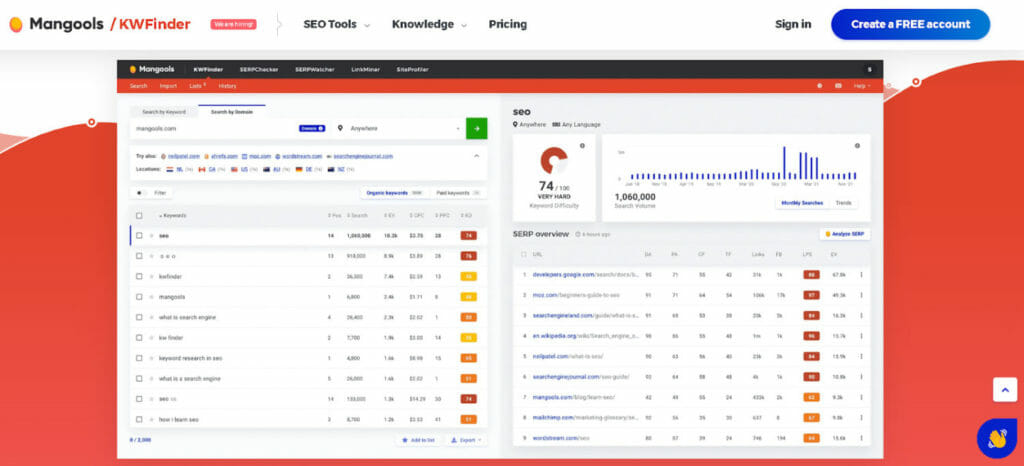
Answer the Public
- Answer the Public generates a comprehensive list of questions, prepositions, and comparisons related to a specific keyword, helping users discover content ideas and address their audience’s queries effectively.
- The tool provides valuable insights into the search behavior of users, including the types of questions they ask and the topics they are interested in. This information can be used to create targeted and relevant content.
- Answer the Public presents search data in a visually appealing format, making it easier for users to understand and analyze the information. The visualizations help identify patterns and trends in search queries.
- Users can choose specific languages and locations to generate keyword ideas tailored to their target audience. This feature allows businesses to optimize their content for specific regions and languages.
- Answer the Public helps users identify trending topics and keywords, enabling them to create timely and relevant content that resonates with their audience.
- Answer the Public does not currently have a mobile app. However, the web-based tool is mobile-friendly and can be accessed on mobile devices through a web browser.
- The tool offers a user-friendly interface that is easy to navigate which allows to generate keyword ideas and explore search insights without any technical expertise.

Moz Local Listing Score
- Moz Local Listing Score provides a detailed local SEO audit, analyzing a business’s online presence across various directories and SEO Optimization tools.
- It identifies inconsistencies and inaccuracies in NAP (Name, Address, Phone) information, ensuring accurate and consistent listings.
- This tool allows users to manage their business listings across multiple directories from a single platform.
- Moz Local Listing Score monitors customer reviews across various platforms, helping businesses stay on top of their online reputation.
- It provides real-time alerts for new reviews, allowing businesses to respond promptly and manage their reputation effectively.
- Local Search Analytics provides valuable insights into a business’s local search performance. It includes visibility, ranking, and customer actions, helping businesses track their progress and identify areas for improvement.
- Moz Local Listing Score allows users to compare their local search performance with their competitors. This feature helps businesses understand their position in the market and identify strategies to outperform their competition.
- Moz Local Listing Score does not have a dedicated mobile app unlike other SEO Optimization tools.
- However, users can access the platform’s features and functionalities through their mobile browser, ensuring flexibility and convenience.
- This tool provides actionable recommendations based on the local SEO audit. It suggests steps to improve a business’s online presence, such as correcting inconsistent NAP information or optimizing directory listings.
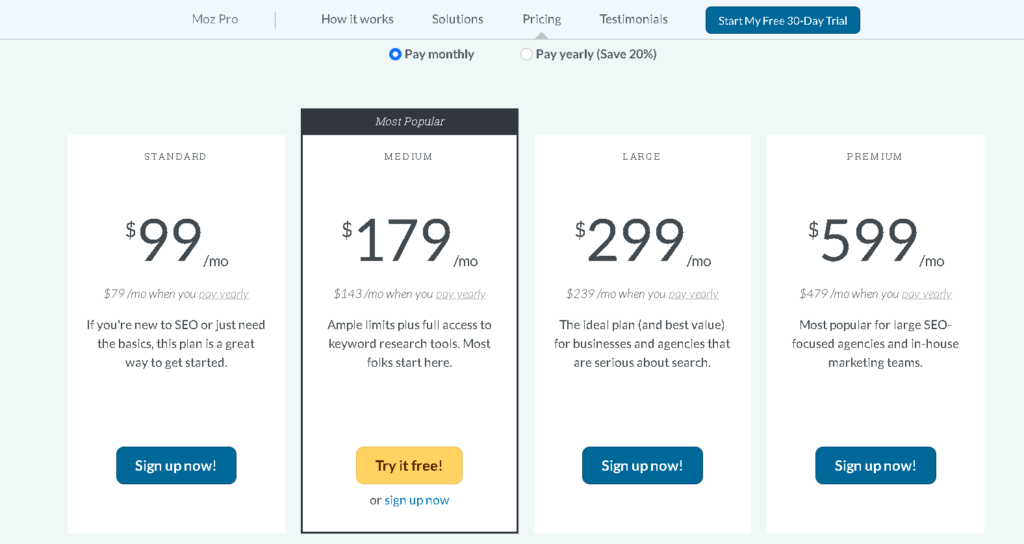
Yoast SEO
- Yoast SEO provides real-time suggestions for optimizing on-page content, including keyword usage, meta tags, and readability to ensure that their content is well-optimized for search engines.
- Yoast SEO generates XML sitemaps that help search engines crawl and index a website’s pages more efficiently and ensures that all relevant pages are discovered and ranked appropriately.
- Yoast SEO allows users to optimize their content for social media platforms, such as Facebook and Twitter. Users can specify custom titles, descriptions, and images to enhance the visibility and click-through rates of their shared links.
- With Yoast SEO’s Redirect Manager, users can easily manage and set up redirects to ensure a smooth user experience by redirecting outdated or broken links to relevant pages, helping maintain SEO rankings.
- Yoast SEO evaluates the readability of content and provides suggestions to improve its clarity and structure helping users create content that is optimized for search engines and easy for readers to understand and engage with.
- Yoast SEO analyzes a website’s content and provides suggestions for internal linking that helps users create a well-connected website structure, improving user experience and search engine visibility.
- Yoast SEO allows users to set a focus keyword for each page or post and provides optimization suggestions based on that keyword to ensure that their content is aligned with target keywords and to improve rank to be higher in search results.
- Yoast SEO does not have a dedicated mobile app. However, its website and plugin are mobile-friendly, allowing users to utilize its features on mobile devices.
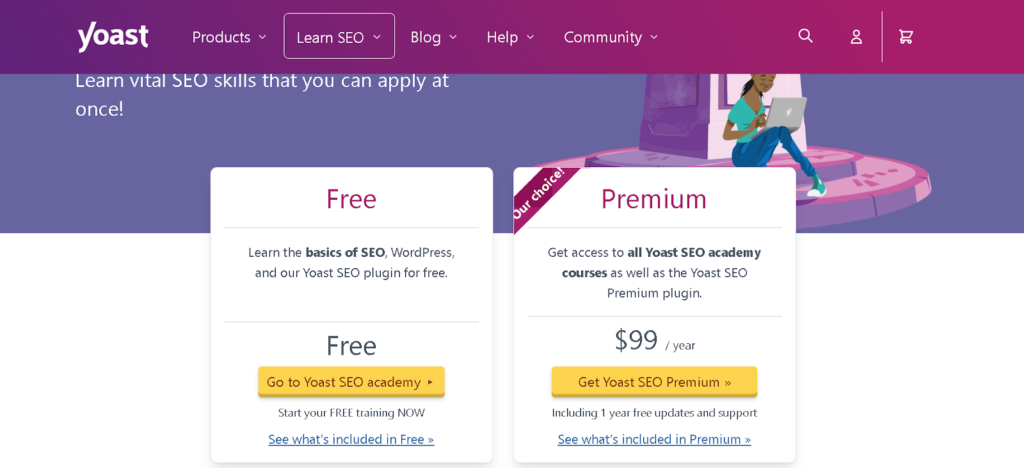
Conclusion
SEO optimization tools offer a wide range of features and functionalities to help businesses improve their website’s performance and achieve higher search engine rankings. By leveraging the power of SEO Optimization tools, businesses can gain valuable insights, optimize their content, and stay ahead of the competition in the ever-evolving digital landscape.
How does seo optimization tools work?
SEO optimization tools work by improving a website’s visibility and ranking in search engine results pages (SERPs). It involves various strategies and techniques, including keyword research, on-page optimization, link building, and content creation. By optimizing these factors, search engines can better understand and index the website’s content, making it more relevant and valuable to users. This, in turn, increases the website’s chances of appearing higher in search results, driving organic traffic and improving online visibility.
How long does it take to see results from SEO optimization tools?
The time it takes to see results from SEO optimization tools can vary depending on various factors such as the competitiveness of the industry, the current state of the website, and the effectiveness of the optimization efforts. Generally, it can take several weeks to several months to start seeing noticeable improvements in search engine rankings and organic traffic. It’s important to note that SEO is an ongoing process, and consistent efforts are required to maintain and improve results over time.
What role does content play in SEO optimization?
Content plays a crucial role in SEO optimization. High-quality, relevant, and engaging content helps attract and retain website visitors, increasing the chances of higher search engine rankings. Well-optimized content with targeted keywords and proper formatting improves the visibility of a website in search engine results pages (SERPs). Additionally, valuable content encourages other websites to link back, improving the website’s authority and credibility. Ultimately, content is the foundation of effective SEO optimization, driving organic traffic and conversions.









